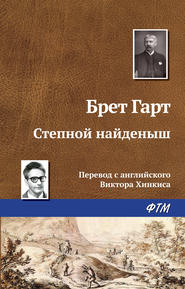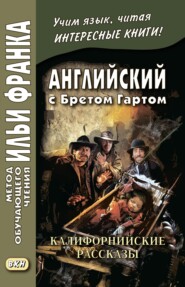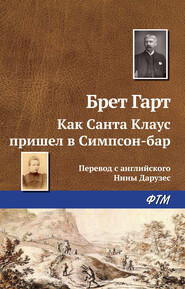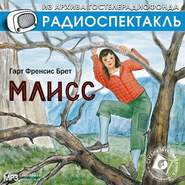По всем вопросам обращайтесь на: info@litportal.ru
(©) 2003-2025.
✖
Gabriel Conroy
Автор
Год написания книги
2017
Настройки чтения
Размер шрифта
Высота строк
Поля
"You can, but I should hardly advise" —
"I didn't ask that. This is a lone hand I'm playin', doctor, and if I'm euchred, tain't your fault. How soon?"
"I should say," said Dr. Duchesne, with professional caution, "that if no bad symptoms supervene" (he made here a half habitual but wholly ineffectual dive for Jack's pulse), "you might go in a week."
"I must go now!"
Dr. Duchesne bent over his patient. He was a quick as well as a patiently observing man, and he saw something in Jack's face that no one else had detected. Seeing this he said, "You can go now, at a great risk – the risk of your life."
"I'll take it!" said Mr. Hamlin, promptly. "I've been playin' agin odds," he added, with a faint but audacious smile, "for the last six months, and it's no time to draw out now. Go on, tell Pete to pack up and get me ready."
"Where are you going?" asked the doctor, quietly, still gazing at his patient.
"To! – blank!" said Mr. Hamlin, impulsively. Then recognising the fact that in view of his having travelling companions, some more definite and practicable locality was necessary, he paused a moment, and said, "To the Mission of San Antonio."
"Very well," said the doctor, gravely.
Strange to say, whether from the doctor's medication, or from the stimulus of some reserved vitality hitherto unsuspected, Mr. Hamlin from that moment rallied. The preparations for his departure were quickly made, and in a few hours he was ready for the road.
"I don't want to have anybody cacklin' around me," he said, in deprecation of any leave-taking. "I leave the board, they can go on with the game."
Notwithstanding which, at the last moment, Gabriel hung awkwardly and heavily around the carriage in which the invalid was seated.
"I'd foller arter ye, Mr. Hamlin, in a buggy," he interpolated, in gentle deprecation of his unwieldy and difficult bulk, "but I'm sorter kept yer with my wife – who is powerful weak along of a pore small baby – about so long – the same not bein' a fammerly man yourself, you don't kinder get the hang of. I thought it might please ye to know that I got bail yesterday for thet Mr. Perkins – ez didn't kill that thar Ramirez – the same havin' killed hisself – ez waz fetched out on the trial, which I reckon ye didn't get to hear. I admire to see ye lookin' so well, Mr. Hamlin, and I'm glad Olly's goin' with ye. I reckon Grace would hev gone too, but she's sorter skary about strangers, hevin' bin engaged these seving years to a young man by the name o' Poinsett ez waz one o' my counsel, and hevin' lately had a row with the same – one o' them lovers' fights – which bein' a young man yourself, ye kin kindly allow for."
"Drive on!" imprecated Mr. Hamlin furiously to the driver; "what are you waiting for?" and with the whirling wheels Gabriel dropped off apologetically in a cloud of dust, and Mr. Hamlin sack back exhaustedly on the cushions.
Notwithstanding, as he increased his distance from One Horse Gulch, his spirits seemed to rise, and by the time they had reached San Antonio he had recovered his old audacity and dash of manner, and raised the highest hopes in the breast of everybody but – his doctor. Yet that gentleman, after a careful examination of his patient one night, said privately to Pete, "I think this exaltation will last about three days longer. I am going to San Francisco. At the end of that time I shall return – unless you telegraph to me before that." He parted gaily from his patient, and seriously from everybody else. Before he left he sought out Padre Felipe. "I have a patient here, in a critical condition," said the doctor; "the hotel is no place for him. Is there any family here – any house that will receive him under your advice for a week? At the end of that time he will be better, or beyond our ministration. He is not a Protestant – he is nothing. You have had experience with the heathen, Father Felipe."
Father Felipe looked at Dr. Duchesne. The doctor's well-earned professional fame had penetrated even San Antonio; the doctor's insight and intelligence were visible in his manner, and touched the Jesuit instantly. "It is a strange case, my son; a sad case," he said, thoughtfully. "I will see."
He did. The next day, under the direction of Father Felipe, Mr. Hamlin was removed to the Rancho of the Blessed Fisherman, and notwithstanding the fact that its hostess was absent, was fairly installed as its guest. When Mrs. Sepulvida returned from her visit to San Francisco, she was at first astonished, then excited, and then, I fear, gratified.
For she at once recognised in this guest of Father Felipe the mysterious stranger whom she had, some weeks ago, detected on the plains of the Blessed Trinity. And Jack, despite his illness, was still handsome, and had, moreover, the melancholy graces of invalidism, which go far with an habitually ailing sex. And so she coddled Mr. Hamlin, and gave him her sacred hammock by day over the porch, and her best bedroom at night. And then, at the close of a pleasant day, she said, archly —
"I think I have seen you before, Mr. Hamlin – at the Rancho of the Blessed Trinity. You remember – the house of Donna Dolores?"
Mr. Hamlin was too observant of the sex to be impertinently mindful of another woman than his interlocutor, and assented with easy indifference.
Donna Maria (now thoroughly convinced that Mr. Hamlin's attentions on that eventful occasion were intended for herself, and even delightfully suspicious of some pre-arranged plan in his present situation): "Poor Donna Dolores! You know we have lost her for ever."
Mr. Hamlin asked, "When?"
"That dreadful earthquake on the 8th."
Mr. Hamlin, reflecting that the appearance of Grace Conroy was on the 10th, assented again abstractly.
"Ah, yes! so sad! And yet, perhaps, for the best. You know the poor girl had a hopeless passion for her legal adviser – the famous Arthur Poinsett! Ah! you did not? Well, perhaps it was only merciful that she died before she knew how insincere that man's attentions were. You are a believer in special Providences, Mr. Hamlin?"
Mr. Hamlin (doubtfully): "You mean a run of luck?"
Donna Maria (rapidly, ignoring Mr. Hamlin's illustration): "Well, perhaps I have reason to say so. Poor Donna Dolores was my friend. Yet, would you believe there were people – you know how ridiculous is the gossip of a town like this – there are people who believed that he was paying attention to ME!"
Mrs. Sepulvida hung her head archly. There was a long pause. Then Mr. Hamlin called faintly —
"Pete!"
"Yes, Mars Jack."
"Ain't it time to take that medicine?"
When Dr. Duchesne returned he ignored all this little byplay, and even the anxious inquiries of Olly, and said to Mr. Hamlin —
"Have you any objection to my sending for Dr. Mackintosh – a devilish clever fellow?"
And Mr. Hamlin had none. And so, after a private telegram, Dr. Mackintosh arrived, and for three or four hours the two doctors talked in an apparently unintelligible language, chiefly about a person whom Mr. Hamlin was satisfied did not exist. And when Dr. Mackintosh left, Dr. Duchesne, after a very earnest conversation with him on their way to the stage office, drew a chair beside Mr. Hamlin's bed.
"Jack!"
"Yes, sir."
"Have you got everything fixed – all right?"
"Yes, sir."
"Jack!"
"Yes, sir."
"You've made Pete very happy this morning."
Jack looked up at Dr. Duchesne's critical face, and the doctor went on gravely —
"Confessing religion to him – saying you believed as he did!"
A faint laugh glimmered in the dark hollows of Jack's eyes.
"The old man," he said, explanatory, "has been preachin' mighty heavy at me ever since t'other doctor came, and I reckoned it might please him to allow that everything he said was so. You see the old man's bin right soft on me, and between us, doctor, I ain't much to give him in exchange. It's no square game!"
"Then you believe you're going to die?" said the doctor, gravely.
"I reckon."
"And you have no directions to give me?"
"There's a black hound at Sacramento – Jim Briggs, who borrowed and never gave back my silver-mounted Derringers, that I reckoned to give to you! Tell him he'd better give them up or I'll" —
"Jack," interrupted Dr. Duchesne, with infinite gentleness, laying his hand on the invalid's arm, "you must not think of me."

















